Industry
Peak Performance: The Impact of Mental Health in the Workplace

Every year, The Peninsula Group conducts a global survey to analyse attitudes towards mental health in the workplace. This year, we surveyed 79,000 businesses across Australia, Canada, Ireland, New Zealand, and the UK to better understand how these trends are changing over time, as well as how they affect performance in the workplace in the UK and beyond.
Results at a glance
• 32% of UK employers have seen increased mental-health related absences
• 78% of employers do not feel confident employees would disclose mental health issues
• Only 1 in 5 employers (20%) are very confident that employees would disclose mental health issues
• 21% of employers are uncomfortable discussing mental health with their employees
• 42% saw an increase in people experiencing issues with mental health
• 14% of UK employers have experienced poor mental health over the last 12 months
• 85% do not offer mental health days in addition to leave entitlements
• 34% of UK businesses have mental health first aiders in the workplace
• 29% of organisations offer mental health training to their employees or managers
• Only 5% of managers experiencing mental health issues used an Employee Assistance Programme (EAP).
Download the full whitepaper
Employer perception vs reality
78% believe employees won’t discuss mental health issues with their managers. But what’s surprising, is some respondents felt they’ve been doing enough to improve mental health at work:
“I have nothing further to add. I feel we are a supportive organisation”
The same respondent also reported an increase in employee mental health concerns.
What’s more interesting is the MHFA England cites in their own survey that 52% of employees feel more engaged and productive when their organisation offers mental health resources (such as access to counselling or wellness programmes).
Mental health stigma in the workplace persists
Some employers surveyed expressed strong negative feelings towards mental health issues, some of which continue to perpetuate the stigma around mental health. In certain instances, employers may not have a fundamental knowledge of mental health issues, their impact, its relation to workplace culture and how it can either cause or worsen issues for their people.
Survey respondent: “Staff have always been unusual and probably many not totally sane for as long as I have worked in an office, over 30 years now in total. I have seen a town where insanity is visible on the streets now daily with so many over the edge and see signs of it everywhere.”
Survey respondent: “Mental health and the provisions that we need to make can be a real drain on small businesses. I appreciate that it is important to look after our team, and I am totally on board with that but sometimes I feel that the person actually needs to put the effort into resolving their own issues rather than us having to provide all the suggestions / solutions. All we can really do is support / make adjustments and allow time, but it really is a resource drain at times”.
Survey respondent: “We feel that more employees, particularly younger ones, use mental health as an excuse for absence, which is bad for those genuinely suffering. They don't understand that sometimes it's OK to feel sad or anxious about things - that's natural and not a mental health issue”.
Survey respondent: “Mental health has become a bit of an excuse......... Of course, there are genuine cases - but there seem to be an awful lot of people jumping on a bandwagon......”
Whilst it is dependent on individuals to overcome ill-mental health, organisations can put the adequate support systems in place to encourage them to do so. Particularly if the issues stem from the workplace.
More survey responses can be found in our full whitepaper.
The majority of employers do want to support their people, but don’t know how to
Of those reporting an increase in sickness rates over the past year (32%) due to mental health issues:
• 85% do not feel very confident that employees would disclose a mental health issue to their employer
• 90% of managers have observed an increase in the number of people experiencing issues with their mental health at work
• 20% claim to be very confident their employees will discuss mental health issues with their line manager or employer
• 53% of organisations don't intend to implement any mental health provisions for their employees in the next 12 months.
Survey respondent: “We would like more support with mental health and what we should be doing, although we have just picked up some more tips via our Health & Safety audit. We also want to look at striking the balance, as we find a lot of employees relate everything to mental health however, we are not sure that's always the case so this is what we would like to understand more about to ensure we put the right support in when its needed”.
Survey respondent: *“We work in healthcare, and we have seen a big spike in clients attending our premises with mental health issues. We have found that this has had an impact on our staff members, as this is often trauma-related for the client. We are taking steps to employ more clinical staff to reduce workloads so that employees have time to process mental health clinical cases”. *
The year-on-year impact
While people are reporting more absences due to poor mental health, we are seeing a decline in other areas too, such as speaking about mental health and a lack of mental health first aiders for people to turn to when they need support.
What impact have you seen on mental health in your workspace over the last 12 months?
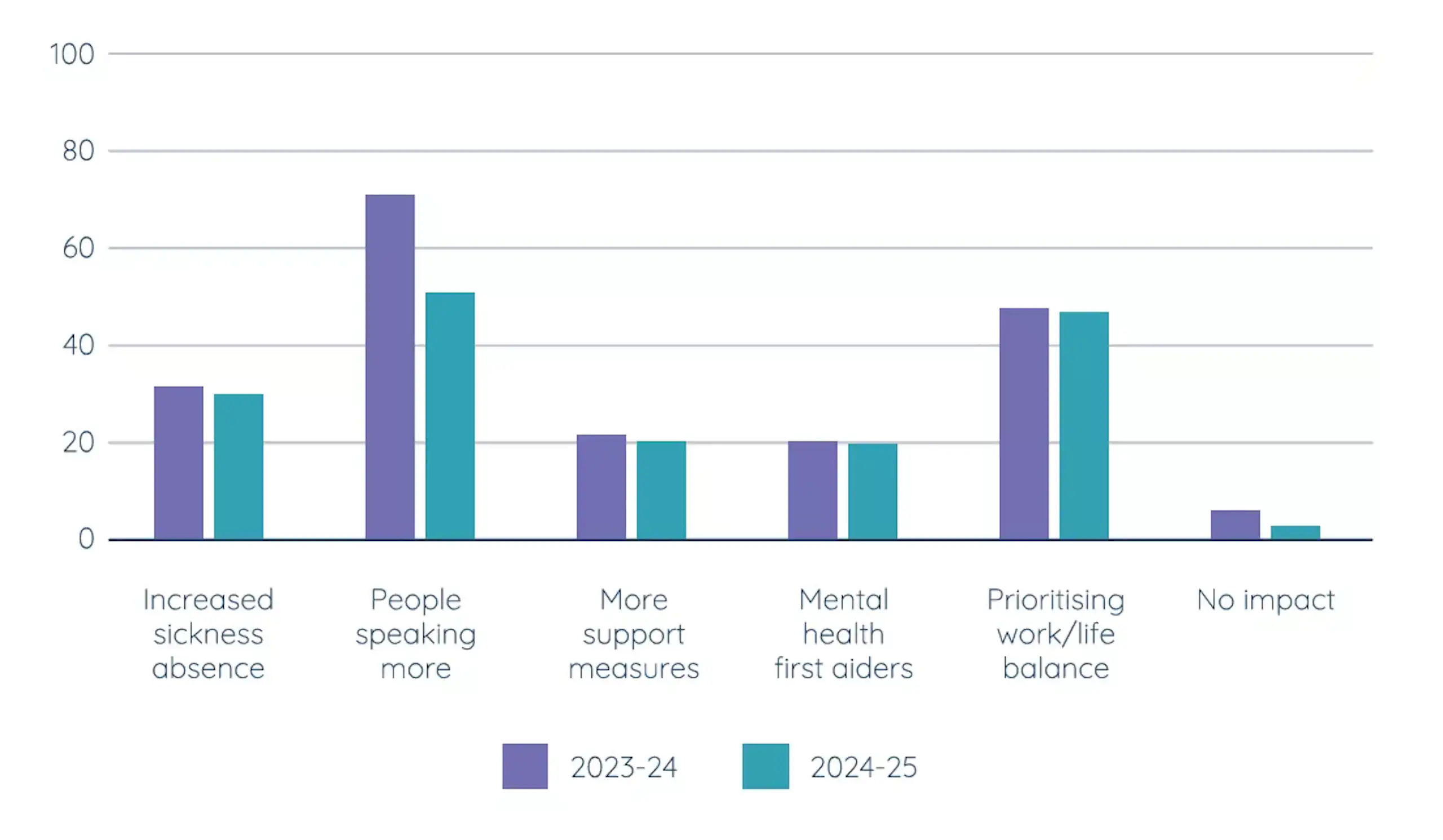
The global impact
• 1 in 3 employers globally saw increased sickness absence due to mental health over the last 12 months
• Canada and Ireland have seen the lowest increased rates of absences related to mental health; Australia saw the largest increase
• The UK is leading the way when it comes to mental health support in the workplace
• Employers in New Zealand are least likely to have workplace mental health support in place
• Most employers globally don’t provide any mental health training to their employees
• Australia tops the charts with work-life balance, but also in increased absences
• Employers in New Zealand are most likely, with UK and Irish employers least likely, to take time off due to mental ill health
What impact you seen on mental health in your workplace over the last 12 months?
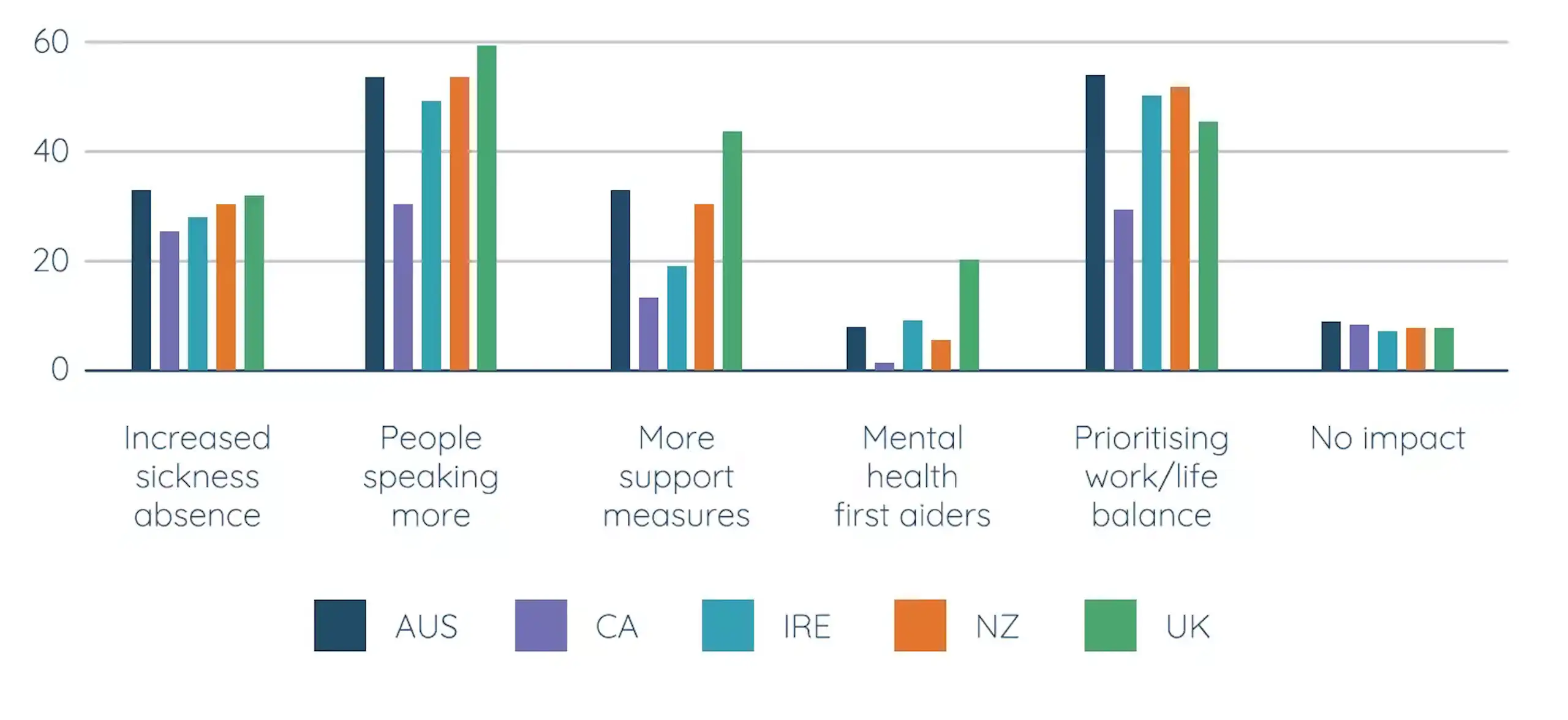
How confident are you that your employees would disclose a mental health issue to you or their line manager?
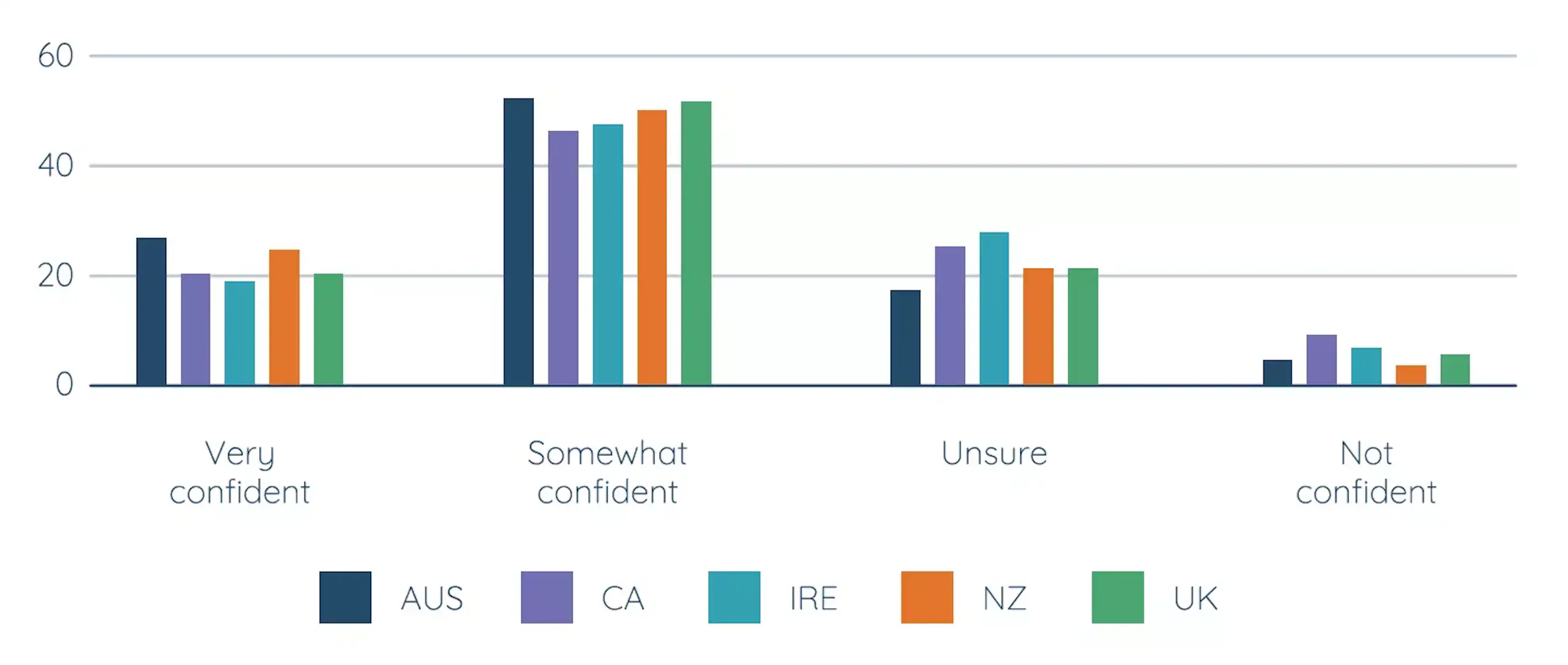
Have you seen an increase in the number of people experiencing issues with mental health in your workplace?
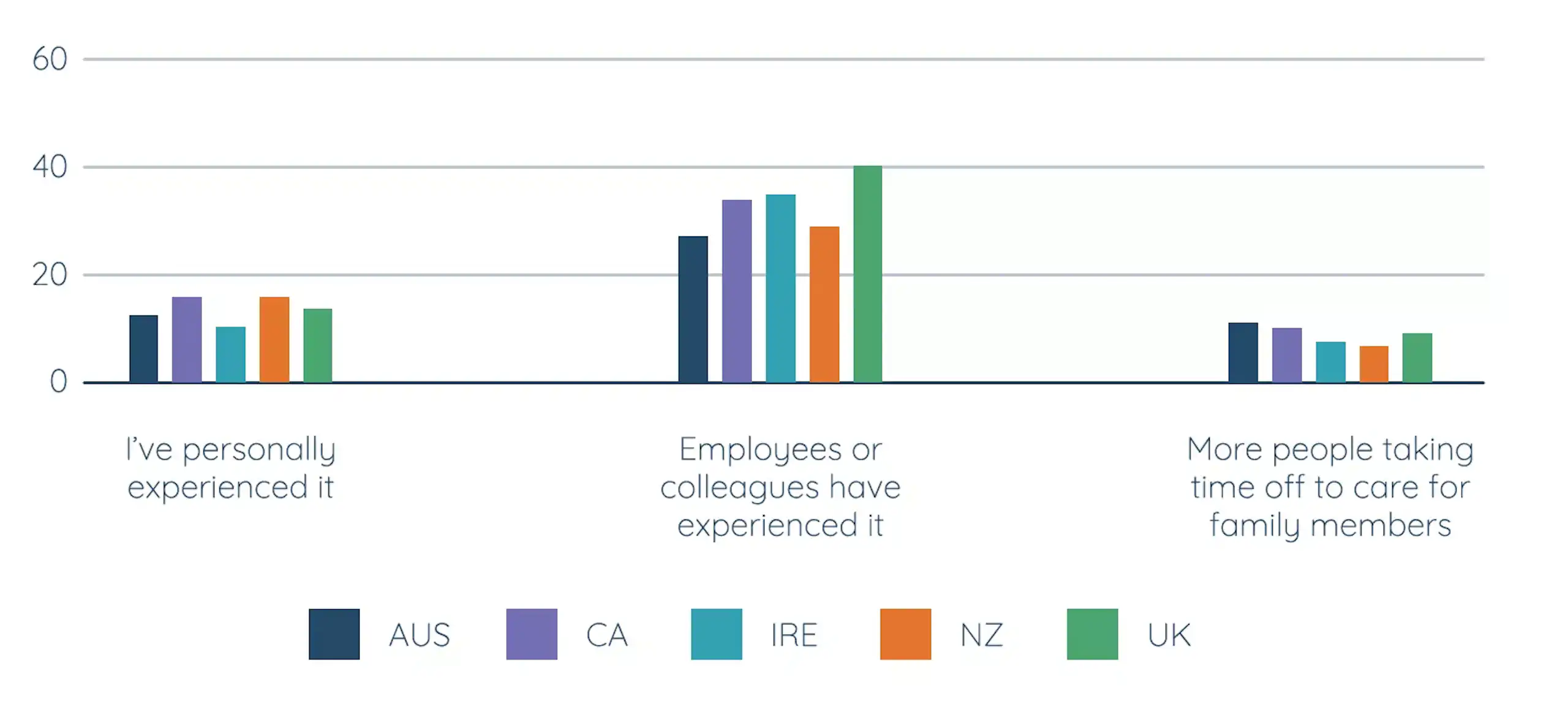
Which of the following do you plan to introduce within the next 12 months?
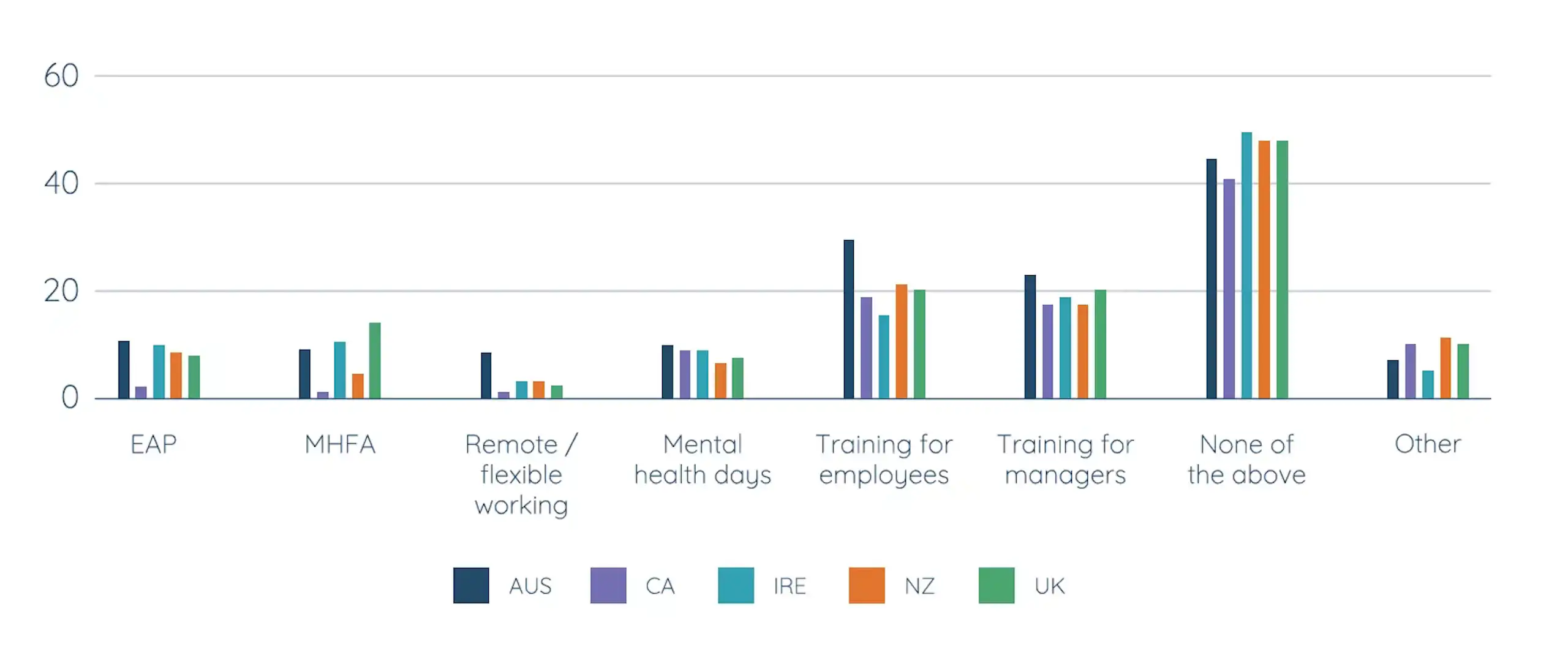
Facilitating mental wellbeing = peak workplace performance
You can only get the most out of your team when they feel supported at work.
Whilst this report has analysed several areas of concern for employers, it’s clear the most important thing is for organisations to be educated on mental health matters. Through education, we can:
• Abolish mental health stigma at work
• Boost workplace performance
• Increase our emotional intelligence, empathy and understanding
• Facilitate real change and workplace accommodations
Key takeaways
1. Embed mental health and wellbeing throughout your workplace
Ensure you have provisions in place to support mental health and wellbeing in your workplace. This needs to be embedded across all levels of your organisation. Create a workplace that normalises conversations about mental health, and lead by example.
2. Do more than signpost support We recommend encouraging real interactions to facilitate open conversations and to really get to the crux of what may be going on with an individual who has experienced increased sickness rates due to poor mental health. Ensure that all your managers receive proper training, including regular refresher training, in how to spot signs that someone is struggling and have open, transparent, supportive conversations with them.
3. Empower your people It’s not about solving an individual's problems. It’s about empowering them to do so. What small changes can you implement to make a difference in their lives for the betterment of workplace engagement, peak performance and psychological safety at work?
How an Employee Assistance Programme can help
As an award-winning EAP provider, we aim high, and we achieve it. Our goal is 100% engagement, and we want everyone in your care to use our service and can be your very own trusted wellbeing partner. Public, private and non-profit organisations globally have relied on our clinical expertise year after year to keep their people on-track.
If you would like to find out more about how the UK and Ireland’s leading EAP can support your organisation, give us a call on 0800 206 2552.
Download the full whitepaper

HA | Wisdom Wellbeing
HA | Wisdom Wellbeing is the UK and Ireland’s leading EAP provider. Specialising in topics such as mental health and wellbeing, they produce insightful articles on how employees can look after their mental health, as well as how employers and business owners can support their people and organisation. They also provide articles directly from their counsellors to offer expertise from a clinical perspective. HA | Wisdom Wellbeing also writes articles for students at college and university level, who may be interested in improving and maintaining their mental wellbeing.






